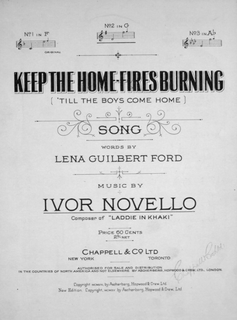 W
W"Abide with Me" is a Christian hymn by Scottish Anglican Henry Francis Lyte. It is most often sung to the tune "Eventide" by William Henry Monk.
 W
WThe Agincourt Carol is an English folk song written some time in the early 15th century. It recounts the 1415 Battle of Agincourt, in which the English army led by Henry V of England defeated that of the French Charles VI in what is now the Pas-de-Calais region of France.
 W
W"Amazing Grace" is a Christian hymn published in 1779, with words written in 1772 by the English poet and Anglican clergyman John Newton (1725–1807). It is an immensely popular hymn, particularly in the United States, where it is used for both religious and secular purposes.
 W
WBritons, Strike Home! is a British patriotic song, originally an air written for a theatrical production by Henry Purcell in 1695. It was popular during the various wars of the 18th and early 19th centuries.
 W
W"Brothers in Arms" is a song by British rock band Dire Straits, the closing track on their fifth studio album of the same name, released on 14 October 1985. It was written in 1982, the year of Britain's involvement in the Falklands War. In 2007, the 25th anniversary of the war, Knopfler recorded a new version of the song at Abbey Road Studios to raise funds for British veterans who he said "are still suffering from the effects of that conflict." "Brothers in Arms" has become a favourite at military funerals.
 W
W"Eternal Father, Strong to Save" is a British hymn traditionally associated with seafarers, particularly in the maritime armed services. Written in 1860, its author, William Whiting, was inspired by the dangers of the sea described in Psalm 107. It was popularised by the Royal Navy and the United States Navy in the late 19th century, and variations of it were soon adopted by many branches of the armed services in the United Kingdom and the United States. Services who have adapted the hymn include the Royal Marines, Royal Air Force, the British Army, the United States Coast Guard and the United States Marine Corps, as well as the navies of many Commonwealth realms. Accordingly, it is known by many names, variously referred to as the Hymn of Her Majesty's Armed Forces, the Royal Navy Hymn, the United States Navy Hymn, and sometimes by the last line of its first verse, "For Those in Peril on the Sea". The hymn has a long tradition in civilian maritime contexts as well, being regularly invoked by ship's chaplains and sung during services on ocean crossings.
 W
W"God Save the Queen" is the national or royal anthem in most Commonwealth realms, their territories and the British Crown dependencies. The author of the tune is unknown, and it may originate in plainchant; but an attribution to the composer John Bull is sometimes made.
 W
W"Good-bye-ee!" is a popular song which was written and composed by R. P. Weston and Bert Lee. Performed by music hall stars Florrie Forde, Daisy Wood, and Charles Whittle, it was a hit in 1917.
 W
W"Home, Sweet Home" is a song adapted from American actor and dramatist John Howard Payne's 1823 opera Clari, or the Maid of Milan, the song's melody was composed by Englishman Sir Henry Bishop with lyrics by Payne. Bishop had earlier published a more elaborate version of this melody, naming it "A Sicilian Air", but he later confessed to having written it himself.
 W
WI'm Backing Britain was a brief patriotic campaign, which flourished in early 1968 and was aimed at boosting the British economy. The campaign started spontaneously when five Surbiton secretaries volunteered to work an extra half-hour each day without pay to boost productivity and urged others to do the same. The invitation received an enormous response and a campaign took off spectacularly; it became a nationwide movement within a week. Trade unions were suspicious of, or even opposed to, the campaign, considering it as an attempt to extend working hours surreptitiously and to hide inefficiency by management.
 W
W"It's a Long Way to Tipperary" is a British music hall song first performed in 1912 by Jack Judge, and written by Judge and Harry Williams though authorship of the song has long been disputed.
 W
W"Keep the Home-Fires Burning " is a British patriotic First World War song composed in 1914 by Ivor Novello with words by Lena Guilbert Ford.
 W
W"Long live our noble Duke" is an alteration traditionally made within the historic county boundaries of Lancashire to the anthem 'God Save the Queen'. The anthem still uses the same lyrics and instrumental tune, but the second line "Long live our noble Queen" is changed to "Long live our noble Duke" out of respect to the reigning monarch in their capacity as Duke of Lancaster. The title is always held by the monarch as head of the royal Duchy of Lancaster, historically Lancaster being the county town of Lancashire. No matter if the sovereign is male or female, they always retain the style of duke, therefore the variant second line never changes even if 'God save the Queen' changes to 'God Save the King' and vice versa.
 W
WThe Music for the Royal Fireworks is a suite in D major for wind instruments composed by George Frideric Handel in 1749 under contract of George II of Great Britain for the fireworks in London's Green Park on 27 April 1749. The music celebrates the end of the War of the Austrian Succession and the signing of the Treaty of Aix-la-Chapelle (Aachen) in 1748. The work was very popular when first performed and following Handel's death. Mozart called the work a "spectacle of English pride and joy".
 W
W"God Save the Queen" is the national or royal anthem in most Commonwealth realms, their territories and the British Crown dependencies. The author of the tune is unknown, and it may originate in plainchant; but an attribution to the composer John Bull is sometimes made.
 W
WThe "Royal Air Force March Past" is the official march of the Royal Air Force (RAF) and is used in some other Commonwealth air forces.
 W
W"Rule, Britannia!" is a British patriotic song, originating from the 1740 poem "Rule, Britannia" by James Thomson and set to music by Thomas Arne in the same year. It is most strongly associated with the Royal Navy, but is also used by the British Army.
 W
W"We'll Meet Again" is a 1939 British song made famous by singer Vera Lynn with music and lyrics composed and written by English songwriters Ross Parker and Hughie Charles. The song was published by Michael Ross Limited, whose directors included Louis Carris, Ross Parker and Norman Keen. Keen, an English pianist also collaborated with Parker and Hughie Charles on "We'll Meet Again" and many other songs published by the company, including "There'll Always Be an England" and "I'm In Love For The Last Time". The song is one of the most famous of the Second World War era, and resonated with soldiers going off to fight as well as their families and sweethearts.
 W
W"Your King and Country Need You" was a British popular song and recitation, with words by Paul Pelham, and music by W. H. Wallis and Fred Elton. It was published in London in 1914, at the start of the First World War, by Lawrence Wright Music. It was written as a recruiting song with the aim of persuading men to volunteer to fight in the War. Half the profits on the first 100,000 copies were to be given to the "H.R.H. Prince of Wales' National Relief Fund".
 W
W"Your King and Country Need You" was a British popular song with words by Huntley Trevor, and music by Henry E. Pether. It was published at the start of the First World War and was written as a recruiting song with the aim of persuading men to volunteer to fight in the War.
 W
W"Your King and Country Want You" was a British popular song, with both words and music by Paul Rubens. It was published in London in 1914, at the start of the First World War, by Chappell Music. It was written as a "Woman's Recruiting Song" to be sung with the intention of persuading men to volunteer to fight in the War. The profits from its sale were to be given to "Queen Mary's Work for Women Fund". The song raised over half a million pounds for the fund.